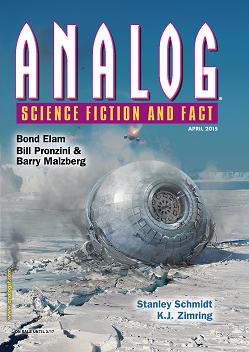 Analog, April 2015
Analog, April 2015
Reviewed by Chuck Rothman
The April issue of Analog has seven stories sticking with what the magazine does best: solid sf adventures.
Bond Elam contributes “The Eighth Iteration,” set on a colony world with a few mysteries: the colonists woke up one day working in the fields with no idea how they got there. Jake Sanchez is the expert on their environment and is in constant conflict with the bully of a colony leader, Lucas Martel and his flunky Harold Sweeny. The group is assisted by a group of bots whose behavior seems to hint they are something more than just machines. With the help of Margaret Winslow, they seek out something she discovered hidden on the computer – another camp they have no knowledge of. The story doesn’t stick with just solving the mystery; it then starts dealing with the ramifications of the solution. Jake is a sympathetic character, and the story has something to say about how societies deal with bad elements.
“Daily Teds” is about Ted Gaz, a graduate student in physics who discovers a strange-looking particle found in an atomic experiment. Ted comes up with an idea as to what has happened, and uses it to build a time machine that sends you forward in time. Testing it on himself, he realizes that it’s really better described as a copier, and, for various reasons, Ted starts making duplicates of himself to help things out. But there are ramifications…. Ron Collins tells a light tale that considers the potential issue with the technology (both human and physical) that’s a joy to read.
Barry N. Malzberg has a reputation for deep and difficult fiction, but teaming up with Bill Pronzini here, the result is pure entertainment. “Transfer Point” follows an unnamed customs inspector (appropriate, since Pronzini is known for a series of mystery stories about an unnamed detective) who is told by his boss Amadeus Finney that the station would be shutting down. The order makes no sense to him, but he goes to his job, and gets the feeling that other things are not quite right. Pronzini’s background in mystery is clear here, as is Malzberg’s imagination. The story is a tiny bit old fashioned, but in a good way.
“Partible” by K.J. Zimring also deals with a mystery, though one of a different sort. The protagonist gets a letter from Immigration saying a nine-year-old boy is in their care and claims he’s the father. It at first seems an obvious fraud especially since the protagonist is a virgin. When the DNA testing shows that the boy’s claim is correct, the story delves into the possibility of having “partible” fathers – more than one for a given child. This is more than just solving a mystery. The character delves into his emotions at the news and what it means to be a father, and the solution is just a part in the character’s emotional journey.
“Down Please: the Only Recorded Adventure of Lars Fouton, Captain’s Lift Operator on the Starship Magnificent” by Adam-Troy Castro isn’t just a gimmicky title. Lars has an apparently meaningless job: running the Captain’s elevator, which the captain rarely uses. When the Captain uses it to take an alien on a tour of the ship, the alien has questions, which seem to hit home the utter uselessness of the job, and raises the point about how humiliating it must be. But the story ends with a funny twist that shows just how badly the alien is mistaken. Not deep, but delightful.
Mike Wood contributes “The Last Days of Dogger City,” set in an abandoned oil rig in the North Sea in a world where the explosion of the Yellowstone supervolcano has created a world of winter. Laura is awakened to the sound of a loud crack, which tells her that the Dogger City oil rig (turned into a settlement) is in imminent danger of collapse. As they evacuate, she realizes her son Josh is nowhere to be found. The story is a straight adventure, where Laura rushes to find Josh before it’s too late and has to confront her fears. It’s a familiar type of story, but in this case quite well done.
I was less impressed by “Dancing in the Dark.” Captain White Eyes is one of the commanders of the Roaring Candle, exploring the cold of space and discovering a vast comet beast, a giant space-living creature. This one is different from the others, and they observe to figure out the reason why. Ramona Louise Wheeler put a lot of thought into the background, but the storytelling fails. There is far too much info dump; indeed, most of the story is made up explaining things (like the command structure of the ship, which has nothing to do with the actual story). There are tons of detailed descriptions and a few perfunctory adventures, but the characters have no emotional resonance, either with what they’re seeing or with each other. It tries to be one big “sense of wonder” story – and certainly that aspect is not neglected – but needs more than just a dry description.
Chuck Rothman’s novels Staroamer’s Fate and Syron’s Fate were recently republished by Fantastic Books. He has a story upcoming in Daily Science Fiction. More details on his website.